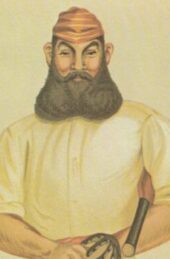It was to be the People’s Will’s most daring act yet. A bomb attack inside the Winter Palace itself. The People’s Will was an extremist revolutionary group active during the reign of Tsar Alexander II. Advocating acts of violence and terror, they sentenced the tsar, whom they considered a criminal, to death. Their manifesto of regicide was based on the belief that the tsar’s death would bring about the end of tsarism. The idea took hold of the popular imagination.
One of those inspired by it was a young workman called Stepan Khalturin.
Khalturin’s carpentry skills were much in demand in St Petersburg during the late 1870s. When he got a job repairing the tsar’s yacht, an opportunity presented itself to him. Such was his standard of craftsmanship that he caught the eye of palace administrators. Would he be interested in joining the maintenance team at the Winter Palace? they wondered.
It was at this point that Khalturin made himself known to key figures in the People’s Will.
The terrorists were already planning a major operation, which involved dynamiting the tsar’s train. They didn’t have the resources to commit to Khalturin’s plan at present, but the prospect of a potential assassin inside the Winter Palace was too good to resist. They told him to take the job and wait for instructions.

Stepan Khalturin
Calling himself Batyshkov, and playing the part of a good-natured but not very bright peasant, Khalturin began working at the Winter Palace in October 1879. He lived in the workmen’s quarters in the cellar, but had access to every part of the palace, including the private apartments of the Imperial Family. On one occasion he even found himself alone with the tsar in his study. He thought about finishing him off there and then with his hammer but couldn’t go through with it.
When the terrorists’ other operation ended in failure, they decided to put everything behind Khalturin. The plan to bomb the Winter Palace was on.
Khalturin smuggled dynamite into the palace in small amounts. To begin with, he hid the dangerous material under his pillow. But the toxic vapours made him ill, causing severe headaches and bulging eyes. It must have led to a few sleepless nights too. He bought a trunk and hid the explosives in there under clothes.
Meanwhile, in November 1879, his People’s Will minder was arrested. When the police searched the man’s apartments they found a plan of the Winter Palace, with an X marking the royal dining room. That should have been the end of the operation. But it wasn’t. After a perfunctory search of palace staff, which failed to find Khalturin’s hoard of dynamite, he was able to carry on as before.
Khalturin and the People’s Will bided their time until 5 February 1880. That evening there was to be a large family dinner held in honour of Alexander of Hesse, the empress’s brother.
By now, Khalturin had amassed more than three hundred pounds of dynamite. The plan was to detonate it in the sleeping quarters of the palace guards, using a clockwork timing device. The guards’ room was directly beneath the royal dining room.
That night, a blizzard raged over St Petersburg. The lights of the Winter Palace flickered and then went out as a massive explosion shook the palace and boomed out across Palace Square.
Eleven people died in the explosion 30 wounded. But the tsar and his family were unharmed. Their entrance into the dining room had been delayed by the late arrival of one of the guests, who was caught in the snowstorm. Most of the casualties were members of the tsar’s palace guard, effectively young men from the peasant class.
Khalturin, depressed by his failure, went into hiding.
Alexander II would eventually be murdered by assassins in March 1881, having survived six previous attempts on his life. But his death did not herald in a new order as the revolutionaries had promised. Quite the opposite. Whereas Alexander II had been a relatively liberal tsar, his successor, Alexander III, was a hard-line reactionary. He suppressed his father’s planned democratic constitution and steered Russia back towards absolute autocracy.
The revolution was postponed, though Alexander III’s actions made it all the more inevitable.
R.N.Morris’s latest book is Law of Blood, a historical thriller set in St Petersburg in 1880, published by Sharpe Books.







